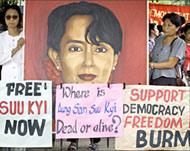ASEAN ‘exploiting terror war’
Human rights groups have accused Southeast Asian nations of using the so-called war against terrorism as an excuse to step up political repression and crack down against their own citizens.

“ASEAN governments have hardened repressive laws and justified the use of violence against innocent civilians in the name of national security and the war on terrorism,” said Debbie Stothard, head of Bangkok-based ALTSEAN, a network of human rights groups. “Ironically, (this) seems to be contributing to more repression and terrorism in the region,” she said.
Stothard was speaking at a hotel in Bali, near the conference centre hosting the annual summit of the Association of Southeast Asian Nations (ASEAN).
After Indonesian authorities denied them access to the main venue, non-governmental organisations from Thailand, Malaysia, Singapore, Indonesia and the Philippines decided to stage an “alternative ASEAN” nearby.
Governments not doing enough
Human rights groups complain that a long-standing agreement between the 10-member ASEAN not to meddle in each other’s internal affairs, has contributed to keeping much of Southeast Asia in the grips of non-democratic regimes.
Stothard blasted the grouping for allowing Myanmar – previously known as Burma – to remain a member despite the government’s crackdown on pro-democracy forces.
 |
|
A strong call has been made for |
Ahead of this year’s summit, ASEAN leaders pressed Myanmar’s military rulers to release pro-democracy leader Aung San Suu Kyi.
But despite that calling, “it is ironic to see that after six years of sitting on their hands, ASEAN leaders are now wringing their hands about Burma,” blasted Stothard. “They should insist that the regime release Suu Kyi and all political prisoners.”
Winner of the 1991 Nobel Peace prize, Suu Kyi, has suffered under house arrest, for more than six years, for her role in the leadership of a pro-democracy movement struggling in that country.
Sunai Phasuk from Forum-Asia blasted the human rights record of Thailand’s Prime Minister Thaksin Shinawatra, saying his government was “a major impediment for ASEAN to truly become a regional community that promotes human rights, democracy and fairness.”
“After decades of struggle for democracy, it has taken Thaksin less than three years to create a police state and install a climate of fear.”
Malaysia also came under fire from Yap Swee Seng from SUARAM, a rights group based in that country, who denounced Prime Minister Mahathir Muhammad. The country “should take responsibility for the continuous deterioration of human rights in Burma as it was that regime’s main sponsor for ASEAN membership,” said Swee Seng.
Indonesian activists criticised the government of President Megawati Sukarnoputri for breaking off talks with separatists in the province of Aceh, on the northern tip of Sumatra island, and launching a military assault against them.
At least 1200 people have died there since May, and the rights groups have complained of restricted access to the region.
“Most of the victims of the war in Aceh are civilians,” said Bonor Tigor of SOLIDAMOR, a Jakarta-based group.